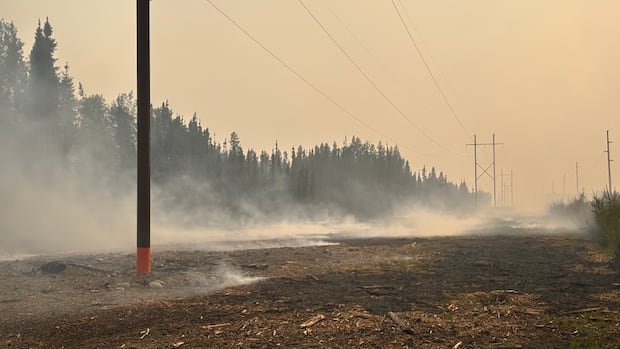For the first time in Quebec, a judge has considered a report prior to the sentence known as an impact of the evaluation of race and culture (IRCA) to help determine the sentence of a black criminal.
Last week, the judge of the Court of Quebec, Magali Lepage, sentenced Frank Paris, 52, 24 months in prison, after Paris declared himself guilty of drug trafficking charges at the Longueuil Justice Palace.
Lepage’s decision, which was delivered from the bank, has not yet been published. But the Presse reports that Lepage He said in his decision That after reading the IRCA, “the court decided to reduce the sentence, which should be 35 months, to 24 months.”
Evaluations, which consider the effects of poverty, marginalization, racism and social exclusion in black criminals, have been used to help determine sentences in other provinces for years, but never in Quebec, until last week.
“I am very happy. It’s a great decision,” said Valérie Black St-Laurent, director of the Jurigo Legal References Service and one of the lawyers who helps train Quebec experts to prepare reports.
But the reaction of the Quebec Minister responsible for the fight against racism, Christopher Skeete, was less brilliant.
“My first instinct is of concern and concern,” Skeete told CBC in an interview on Thursday.
“If we live in a society where people are judged by the color of their skin, I am not sure that it is a path to follow to fight racism,” Skeete said.
Similar report for indigenous criminals
Although the reports prior to the sentence that consider the personal and economic circumstances of the persons convicted of crimes are used in many cases in the Canadian courts, Black St-Laurent said that these reports do not reach far enough when they are considered black criminals.
“There are many things that are systemic and institutional that also affect someone’s behavior, their perspective of life and how they sail for society,” he said.
“This is the reason why traditional reports prior to the sentence are insufficient to really address the entire portrait of a black defendant.”
Black St-Laurent said the IRCAs were first used in sentence considerations in Nueva Scotia in 2014, and that since then, they have been used in several judicial decisions throughout Canada. The federal government provides funds to help cover the costs of preparing IRCA and training experts on how to write them.
A similar type of report prior to the sentence for indigenous criminals, called Gladue report, has commonly used in Canadian courts since a decision of the Supreme Court in 1999.
This decision forces Judges to use Gladue reports to consider systemic factors such as the history of residential schools, child welfare systems and colonization by sentencing all indigenous criminals.
“The idea is to make the process more fair, recognize that I could have had fewer opportunities, less life options,” said Karine Millaire, a law professor at the Montreal University, CBC in an interview.
Millaire says that IRCA for black criminals are the next logical step after Gladue’s reports.
“Indigenous peoples are the group in Canada that experiences the most systemic discrimination in the judicial system. Blacks are the second group,” he said.
“Black people tend to be more likely to be accused, even if they are not guilty of some crimes. The system also tends to give them more prison sentences,” Millaire said.
But IRCA do not have the same legal weight as Gladue’s reports, he said.
“We amend the Criminal Code to strengthen this obligation to consider systemic considerations using Gladue reports,” Millaire said. “But in the case of black people, this practice is developing in jurisprudence, but the Criminal Code has not yet been modified.”
Reduced Judgment Case
In the case of Paris, whom he received a reduced prison sentence last week, the IRCA is 54 pages.
It includes a summary story of the black experience in Quebec, with references to slavery, racial profiles and different forms of systemic discrimination.
He also uses interviews with Paris and his friends and family to describe how these factors are intertwined with their personal experience.
In the absence of a written decision of the judge, it is difficult to say precisely what he points out in the IRCA that she drew to determine the sentence of Paris.
In a column ThursdayThe columnist of the Presse, Patrick Lagaceé, criticized the IRCA used in the case of Paris, calling it “shit.”
Lagaceé said Irca is full of logic jumps and statements that are not backed by facts. He pointed out that Paris told the authors of IRC that he was a good student and that he never experienced any form of racism in primary or secondary school.
Lagaceé also opposed the passive voice of the report, noting that he says that Paris “ended up getting involved in the sale of drugs” instead of saying “he sold drugs.” LagaCé concludes that the report seems to eliminate most of Paris’s personal responsibility for their crimes and completely blames them for systemic factors.
Millaire, however, said that LagaCé did not consider the report in its entirety and the jurisprudence that supports the use of IRCA.
“I think his opinion is very unfortunate in the context in which it is still difficult for systemic racism to be recognized in the context of Quebec,” Millaire said.
He also pointed out that, unlike Gladue’s reports, the judges are not obliged to consider the findings of the IRCA; It depends on your discretion. It is only one of the many useful tools that a judge can use when considering the sentence, he said.
“It is not because you consider a report that must necessarily base your decision only on that report.”
Political reaction
Skeete says that judges already have enough room to consider mitigating circumstances in their sentence decisions.
“The unwanted result of what we are doing here is to create a new type of law, which inherently creates a new type of citizen,” he said. “This new citizen is immune to certain actions in the Criminal Code due to the color of their skin.”
The minister was not the only worried politician.
Thursday afternoon, Pascal Paradis del Pari Québécois (PQ) He said in his x account which rejects the idea of differentiated justice based on skin color.
“Exacerbating ethnic identities will not create greater social cohesion or social justice; on the contrary,” he wrote. He pointed out that the PQ is reserving more comments on when the judge’s written decision is revealed.
It is not clear when it will be.
In the IRCA of Paris report, the authors indicated that they are currently completing two IRCA in Quebec to “support the introduction of these cultural evaluations in this province.”








